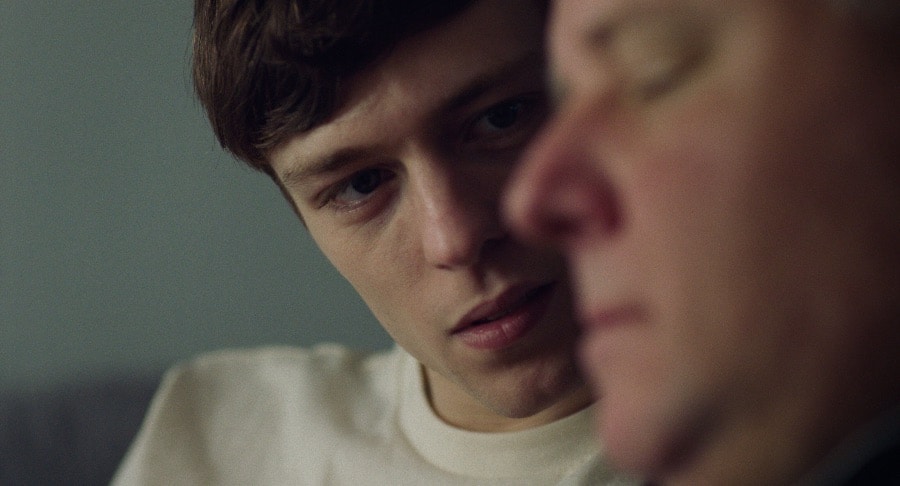




Dir: Mikko Makela | UK/Finland/Belgium | 2024 110′
The title of Mikko Makela’s Sebastian conjures up suggestions of Yukio Mishima or Derek Jarman’s imagery around the martyrdom of Saint Sebastian. The truth of the matter is that this is the nom de plume that Max Williamson, a day time professional literary writer gives as his name for secretive night time sex work. The film is a portrait of a young gay man navigating the trials and tribulations of life with the realisation that these are the arrows of pain that can strike us all with the not so easy passages of life that most of us experience. The film is a hybrid mix of European UK/Finnish/Belgium co-production with scenes shifting between London, Glasgow and Brussels. It is the follow up for Finnish director Mikko Makela who made Moments in the Reeds in 2017 for which this stronger narrative is an advance on the cautionary tone of the earlier film.
Sebastián is set in a range of European cities, switching between the night time economy of sex trade work contracted via on line apps with the daytime cut throat and ruthless rivalry of literary publishing worlds although without the lacerating cruelty of the corporate finance world of the TV series Industry. Sex scenes are at the heart of the film and mark out Makela as a director to note. They feel natural and authentic without, surprisingly, being particularly graphic or explicit. The contrast with male-on-male scenes in Ang Lee’s Brokeback Mountain, Luca Guadagnino’s Queer and Brady Corbet’s The Brutalist is striking as these films don’t always achieve the authenticity and emotional feeling with which gay directors like Makela can bring to scenes of men having sex with men.
Makela has a style and approach to filmmaking that is closer to the sensitive naturalism of Andrew Haigh for whom Haigh’s sex worker doc Greek Pete could be viewed as a documentary given a fictional rewrite by Makela. There is also a specific reference to the more hard-edged realism of French filmmaker Maurice Pialat with an extract from A Nos Amours (1983). This involved a young woman navigating her sexuality often with older men, echoed here by Max /Sebastian who explores his sex life with contemporaries, group sex encounters and in the film’s best scenes, sexual intimacy of a different nature with an older man.
Makela’s skill with actors is apparent with brief sequences involving Stella Gonet as Max’s mother, Ingvar Sigurdsson as a predatory punter who turns on him and Jonathan Hyde as an older client that give the film real gravitas. The camera of Likka Salminen has a fine sense of location, background detail, with frequently beautiful and sensitive framing and movement of camera. This is all linked to the focus on Ruaridh Mollica’s performance as the dual layered Max/Sebastian who is at the centre of the entire film’s framing. It is a real challenge to base a film on an actor as the centre of a film involving a form of autofiction – stream of consciousness created out of ideas and real life. Mollica is an often-graceful wounded gentle creature with quiet charisma as he progresses during the course of the film with a finale involving a point of view first person use of the camera eye. This has been used with real impact by Federico Fellini on the face of Giulietta Masina as a sex worker during the final moment of Nights of Cabiria and also by Francois Truffaut with the frozen finale of Jean Pierre Leaud’s troubled face in The 400 Blows. The weight of this device as used in Sebastián doesn’t feel quite so resonant. It does however leave open the far wider possibility that Makela is a gay film director with a genuine new voice and observant eye to watch out for what comes next. Peter Herbert
https://www.peterherbert.online
https://theartsproject1.wixsite.com/theartsproject
SEBASTIAN is released in cinemas 4th April.